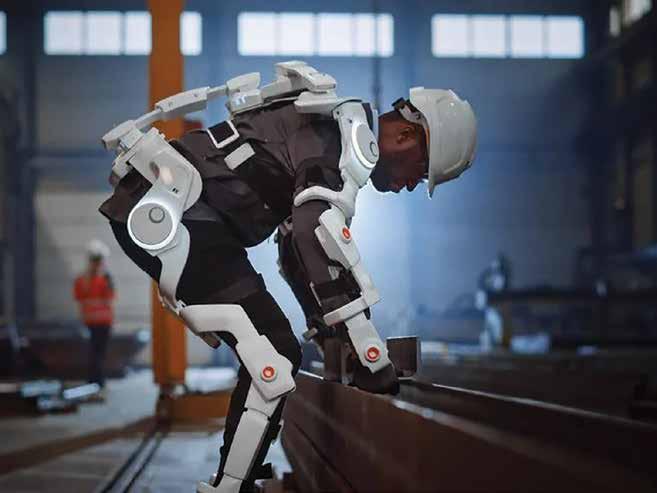Versuchen GOLD - Frei
Revolutionizing rehabilitation: Redefining mobility with exoskeleton technology
PCQuest
|February 2025
What if technology could help people walk again? A revolutionary exoskeleton is making it possible-blending Al, robotics, and smart materials to turn limitations into possibilities. The future of mobility is here, and it's learning with every step
-

In a world where technological advancements are revolutionizing healthcare, Astrek Innovations is at the forefront of assistive robotics, pioneering next-generation mobility solutions for individuals with disabilities. A new exoskeleton is enabling people to walk again. It combines AI, robotics, and smart materials to help those with mobility issues stand up and take steps. Every time someone uses it, the device learns and improves.
At the heart of this transformation is Robin Kanattu Thomas, CEO of Astrek Innovations, whose vision is deeply rooted in personal experience and a commitment to inclusivity.
“Modern medicine is incredibly advanced, yet the rehabilitation sector lags decades behind. That’s where we wanted to make a difference,” said Robin.
This realization led Astrek to develop cutting-edge exoskeletons—wearable robotic devices that help mobility-impaired individuals walk again. By integrating robotics, artificial intelligence (AI), and modular engineering, Astrek is making rehabilitation technology more affordable, precise, and adaptable.
The Inspiration: Bridging the Rehabilitation Gap
Robin’s journey began with a deeply personal incident.
“My grandfather was incredibly healthy, but after a small accident, he lost his ability to walk. Even after successful surgeries and treatment, he couldn’t regain mobility—not because of medical limitations, but due to the lack of effective rehabilitation.”
This experience highlighted a critical gap in rehabilitation care. While the world is designed for the 80% of able-bodied individuals, the 20% with disabilities remain underserved.
Determined to bridge this gap, Robin and his team focused on exoskeleton technology—a breakthrough designed to help patients regain independence through robotic-assisted movement.

Diese Geschichte stammt aus der February 2025-Ausgabe von PCQuest.
Abonnieren Sie Magzter GOLD, um auf Tausende kuratierter Premium-Geschichten und über 9.000 Zeitschriften und Zeitungen zuzugreifen.
Sie sind bereits Abonnent? Anmelden
WEITERE GESCHICHTEN VON PCQuest

PCQuest
The invisible intelligence powering healthcare and finance
What if your hospital's AI could think like a surgeon and your bank's software acted like a risk analyst? Inside Iksha Labs, machines aren't just smart, they're regulation-ready, real-time coworkers for the world's most demanding industries
5 mins
December 2025

PCQuest
How AI and cloud can optimize the performance and efficiency of edge devices
AI isn't just living in the cloud, it's getting its boots dirty at the edge. From oil rigs to warehouses, learn how smart tech is teaming up with cloud power to make machines faster, decisions sharper, and industries safer
2 mins
December 2025

PCQuest
Beyond automation: A shift in developer cognition
From modular code generation to knowledge-as-a-service, a new Al-human alliance is reshaping how enterprise software is built, tested, and governed. Welcome to the new age of intelligent development
5 mins
December 2025

PCQuest
Ubon SP-95
Budget Bluetooth speakers often try to pack in more than they can handle. The Ubon SP-95 takes a different route. It focuses on the basics and aims to execute them well. You get a 20W output, Bluetooth 5.3, USB and TF card playback, AUX input, FM radio, and a Type-C charging port. All of this comes at a price of Rs 1,499, which puts it in the sweet spot for students and young users who want something reliable without spending too much.
1 mins
December 2025

PCQuest
India's esports scene is about to go BOOM
India's gaming boom needs more than tournaments. It needs creators, infrastructure, pathways, and a long-term vision that treats esports as entertainment for all, not just the pro tier. JioBLAST wants to write that next chapter by blending fans, creators, and competitors into one connected ecosystem
6 mins
December 2025

PCQuest
AI's power shift begins at the edge
Cloud isn't king anymore. AI is moving home to your laptop, your office, and your private cloud. What's driving this silent shift from scale to sovereignty? The answer lies at the edge, where performance meets control
4 mins
December 2025

PCQuest
A quiet revolution under the hood
When hardware stops holding you back, imagination runs wild. From dorms to dev studios, Indian gamers are rewriting the rules not with hype, but with high frame rates, future-ready builds, and a hunger that's finally met its match.
3 mins
December 2025

PCQuest
The collaboration paradox
What if your workflow wasn't broken, but the tools were never built for your brain in the first place? A new creator-led rethink is turning chaotic feedback, endless loops, and scattered files into something surprisingly rare: peace
4 mins
December 2025

PCQuest
2025 inflection point Where hype met hard truth
2025 wasn't just another tech year. It was the year tech grew up, left behind the hype cycles, and got a real job. From autonomous AI to sovereign data bunkers, the industry finally started chasing outcomes, not headlines
4 mins
December 2025

PCQuest
The rise of Indian esports isn't luck; it's logistics
As esports in India finds mainstream momentum, a silent revolution is unfolding, shaped by smarter devices, deeper analytics, and disciplined creator ecosystems. The future isn't a bet. It's a build
4 mins
December 2025
Listen
Translate
Change font size
